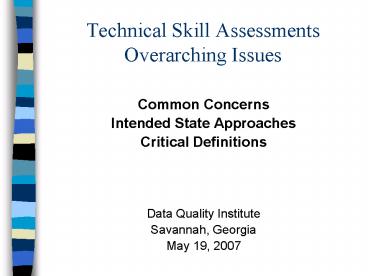Technical Skill Assessments Overarching Issues - PowerPoint PPT Presentation
Title:
Technical Skill Assessments Overarching Issues
Description:
Technical Skill Assessments Overarching Issues Common Concerns Intended State Approaches Critical Definitions Data Quality Institute Savannah, Georgia – PowerPoint PPT presentation
Number of Views:117
Avg rating:3.0/5.0
Title: Technical Skill Assessments Overarching Issues
1
Technical Skill AssessmentsOverarching Issues
- Common Concerns
- Intended State Approaches
- Critical Definitions
- Data Quality Institute
- Savannah, Georgia
- May 19, 2007
2
Overarching Issues Topics
- Don Hilber, DTI
- Technical Skills Assessment Study Group advice
for DQI agenda / associated research - Results of Questions for States issues of
greatest importance stage of development
intentions in transition plan beyond - Framework for approaching tech skills indicators
- Bob Sheets, U of IL
- Recap recommendations from 2005-2006 DQI
- Perkins IV realities what still applies and
what does not - Facilitated discussion Q A
3
Technical Skill Assessment Study Group
- Spun off of Next Steps Working Group
- 25 states, OVAE, associations and consultants
about 50 get notices - Accountability / data experts and curriculum /
assessment expert some administrators - Eleven calls starting Jan 10, 2007
- Invited private companies to address group and
take questions - Informed DQI desired other research knowledge
of others, (deferred) inventory
4
Study Group Most Active States
Alaska Secondary North Carolina Secondary
Arizona Secondary Ohio Both
Arkansas Both Oklahoma Secondary
Florida Secondary Oregon Secondary
Hawaii Secondary South Carolina Secondary
Indiana Postsecondary Tennessee Postsecondary
Iowa Secondary Texas Both
Michigan Secondary Utah Both
Minnesota Postsecondary Virginia Secondary
New York Postsecondary Wisconsin Both
5
Experts Invited to Address Technical Skill
Attainment Study Group
- NOCTI (Foster )
- ACT (Klemme )
- VTECS (McCage, Hattaway)
- XPAND Corp (Osman, Butler)
- OSU (Mahlman )
- ABG / Skills USA (McClelland )
- Others Post-DQI ?
6
Questions Asked of States
- Level of Experience with Technical Skill
Assessments Secondary and Postsecondary - Details from Experienced States
- Importance of 16 Issues
- Intentions as to Methods, Types of Skills, When
Assessment Will Occur - Numerator / Denominator in Transition Plan if
Different than Guidance
7
Experience Among States
Using Technical Skill Assessments Secondary Postsecondary
Very Experienced no need to make alterations 5 1
Somewhat Experienced will need to make alterations 5 2
Experienced with some methods or program areas 8 14
Just Starting to Gain Experience or Familiarity 12 10
No Experience Whatsoever 5 7
Did Not Submit 17 17
8
Alternative to Guidance
- 23 of 35 States (65) Following Guidance on
Technical Skill Attainment for Both Secondary and
Postsecondary - Secondary Exceptions 7 States
- 2 completion and 2 GPA (permanent or interim?)
- 3 specific changes year or numerator
- Postsecondary Exceptions 9 States
- 2 completion and 1 GPA (permanent or interim?)
- 2 waiting for data from colleges
- 3 specific changes to student definitions, year
or numerator
9
Issues of Importance Top Tier
- Definition of Technical Skill
- Determining Phase-in / Interim Reporting
- Defining / Specifying Validity and Reliability
- Data Collection and Reporting
- End of Course / End of Program Assessments
- Development / Administrative Costs
- Value of Assessment to Student
- Student Definitions (Concentrator)
- Suitability of Assessment to Perkins
- Alignment to Standards
- All of these 60 Critical or Very Important
10
Issues of Importance Second Tier
- Distinguishing Among Foundational, Generic or
Occupational-Specific Skills (may have confused
w/ Definition of Technical Skill) - Ability of and Devices for States to Collaborate
and Pool Resources - Dealing with Local v State Development or
Selection of Assessments - Developing a Seamless System for Secondary and
Postsecondary - Relationship Among Perkins Indicators
- Clarifying Clusters, Pathways and Programs of
Study
11
Technical Skill AttainmentA Framework
- WHO needs to be measured?
- WHAT is to be measured?
- WHEN should measurement occur?
- HOW can measurement be accomplished?
- In general order of most uniformity to most
flexibility
12
WHO Needs to be Measured?
- Student Definitions
- Concentrator
- Numerator / Denominator (also WHEN)
- Presented Day One (OVAE)
- Discussed Day One (Definitions) and Overarching
Issues (Tech Skill Attainment Measure)
13
WHAT is to be Measured?
- Definition of Technical Skill
- Relationship of Technical Skill Attainment to
Other Perkins Indicators Academic, Completion - Distinguishing Among Foundational, Generic and
Occupational Skills - Clarifying Clusters, Pathways and Programs of
Study - Presented Day One (OVAE) and Two
- Discussed Breakouts One (S PS) and Two
(Similar States)
14
WHEN Should Measurement Occur?
- Data Collection and Reporting
- Determining the Phase-In Period and Interim
Reporting - End of Course versus End of Program
- Developing a Seamless System for Secondary and
Postsecondary (also HOW) - Presented Day Two - Panels
- Discussed Breakouts One (S PS) and Two
(Similar States)
15
HOW Can Measurement be Accomplished?
- Defining Validity / Reliability
- Alignment to Standards
- Suitability to Perkins
- Value to the Student
- Local v State Development / Selection
- Development / Administrative Costs
- Pooling / Sharing Resources
- Presented Day Two - Panels
- Discussed Breakouts One and Two
16
DQI Past and Present
- Quick Review of 05-06 Data Quality Institute
- Perkins IV Impact on
- Student Definition Concentrator
- Secondary Technical Skill Attainment Numerator
and Denominator - Postsecondary Technical Skill Attainment
Numerator and Denominator - Clarification on Overarching Issues
- Student Definitions (Recap of Day One)
- Phase-In Period and Interim Reporting How?
- Definition of Technical Skill
- Versus Academic Skill and Completion (Secondary)
- Versus Credential, Certificate or Degree
(Postsecondary)































